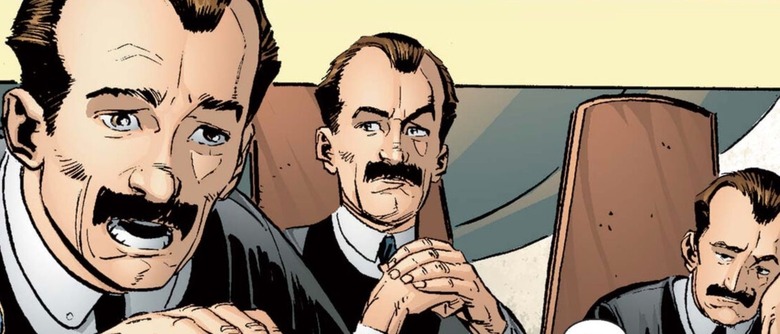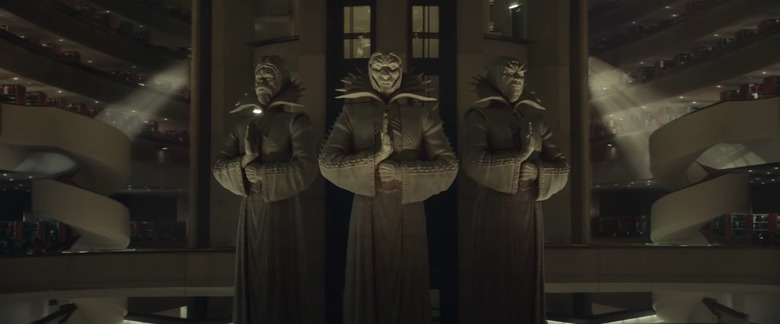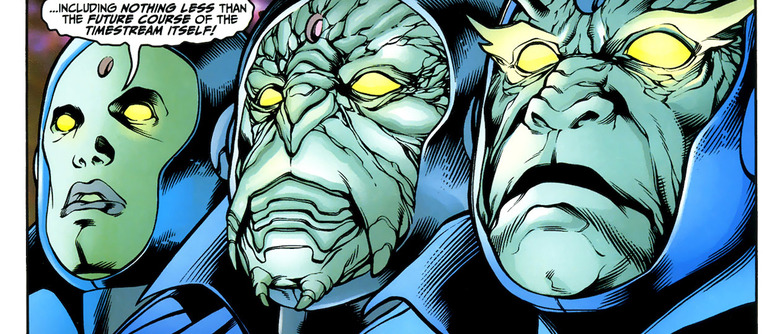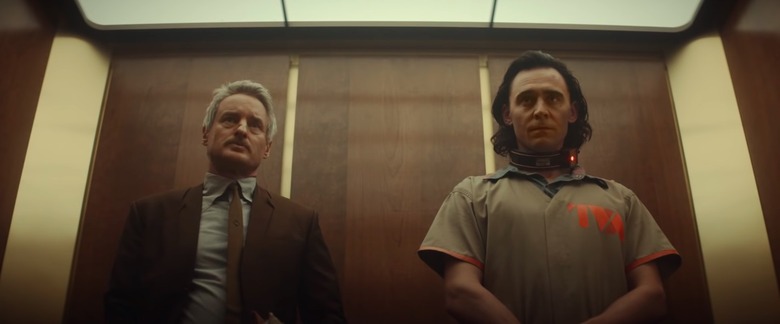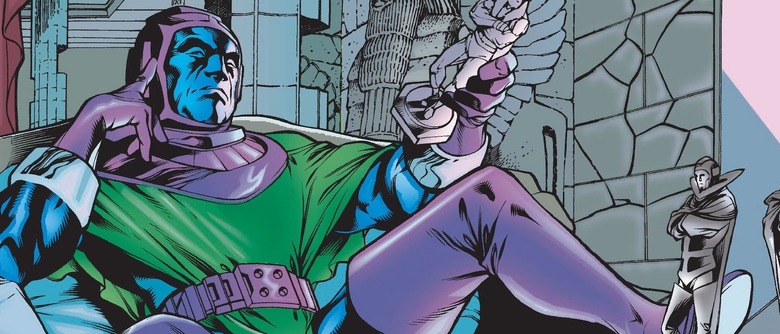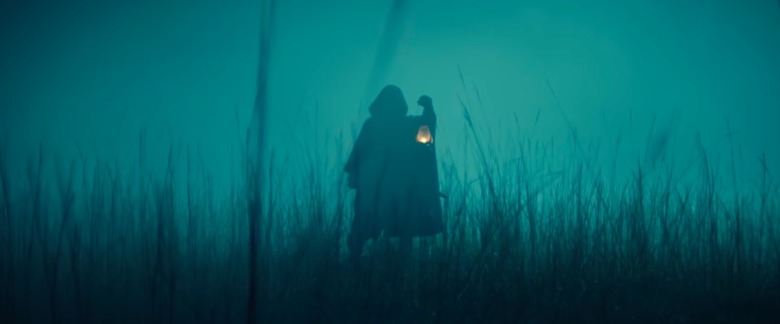Who Are The Timekeepers And What Could Their Comic History Mean For 'Loki'?
It's hard to believe it's been over two years since Avengers: Endgame, but when Loki hits Disney+ on Wednesday, it will mark the long-awaited return of Tom Hiddleston's character, who teleported out of the movie with the Tesseract in April 2019. Since then, the world has undergone a pandemic and the Marvel Cinematic Universe has pivoted to the small screen, with WandaVision, The Falcon and The Winter Soldier, and now, Loki, luring Marvelites to Disney's streaming service, even as Black Widow revs up to finally lure them back to theaters this summer.
First, Loki died. Then, his past self — a 2012 Avengers-era "variant" — got ahold of said Tesseract, escaping the clutches of SHIELD and Earth's Mightiest Heroes. Now, he's headlining his own TV series. In Loki, he's traded one set of jailers for another, with a shadowy temporal organization called the TVA scooping him up. Even Loki's a bit confused about what their name means. "You'll catch up," promises Owen Wilson's character.
And so you shall, as we look to the comics to see what mighty Marvel history can tell us about the TVA and their so-called "Timekeepers," who could be major power players in the MCU going forward.
Mobius M. Mobius and the TVA
First things first: TVA stands for "Time Variance Authority," which explains why they would concern themselves with a Loki variant running amok across time. Wilson is playing Mobius M. Mobius, a character with a background in middle management for the TVA. Anyone who grew up reading Marvel in the mid-1990s may recall seeing dedications to the late Mark Gruenwald in the pages of their comics. The mustachioed Mobius, who helps oversee the order of the multiverse, is based on Gruenwald, a writer, editor, and continuity expert for the House of Ideas.
In the comics, it turns out Mobius is one of several clones, all of whom work for the TVA and go by different names, like Mr. Orobourous, Mr. Paradox, and — ahem — Mr. Tesseract. Here's how he explains the TVA to Loki in the show:
"We protect the proper flow of time. You've picked up the Tesseract, breaking reality. I want you to help us fix it."
The official trailer for Loki, released back in April, opened with a scene where the God of Mischief is taken before a judge, played by Gugu Mbatha-Raw. On the wall behind her, there are three wooden faces. Elsewhere in the trailer, we see three statues in the atrium of the TVA building.
These are the Timekeepers, who made their first appearance in Thor #282, written by Ralph Macchio and none other than Mark Gruenwald. The trailer even juxtaposes their image with a voiceover where Loki says, "The Timekeepers have built quite the circus."
Heroes Reborn?
The comics have indeed depicted the Timekeepers and their evil precursors, the Time-Twisters (more about them later) as a trio. They were created by the final director of the TVA at the end of time in order to help guide the universe after its death and rebirth.
Unlike other superhero film franchises such as Sony's Spider-Man and Fox's X-Men series, the MCU has yet to reboot itself, preferring instead to keep the same shared universe going with (mostly) the same actors. Universe-wide relaunches, however, are a common occurrence in comics. With actors finishing their contracts and/or aging out of roles, it's possible that, somewhere down the line, there could be a phase of the MCU where the current continuity ends and we see heroes reborn (a la the comics event of the same name) with new faces.
For now, the important thing is this: the Timekeepers have a hand in shaping universes. Their entrance into the MCU, as it opens up from a universe into a multiverse, could mean big things for its future. Historically, these beings have wielded absolute power, and as we all know, that corrupts absolutely. They regulate the multiverse and can even collapse timelines that pose a threat to it—or them and their hold over it.
Avengers Forever
The phrase "Wakanda forever," uttered memorably by Chadwick Boseman in Avengers: Infinity War, has become a rallying cry in the MCU, even more so in the wake of Boseman's untimely passing. Just last month, Marvel Studios unveiled Black Panther: Wakanda Forever as the title of its upcoming Black Panther sequel. However, it's not the only time the word "forever" has been linked to a Marvel title. In fact, the Timekeepers actually featured prominently in a 12-issue comic book miniseries entitled Avengers Forever.
Written by Kurt Busiek and Roger Stern and penciled by Carlos Pacheco, this miniseries saw the Timekeepers take on an antagonistic role. In it, they sought to prevent multiple futures where humans, juiced up on a cosmic power called the Destiny Force, ruled over the stars with an iron fist...or Iron Man armor, as the case may be. The Avengers, it seems, were destined to break bad as the Galactic Avenger Battalion, a kind of futuristic yet medieval, Marvel-ized version of the Imperial Stormtroopers in Star Wars. Instead of the Galactic Empire, they would serve the Terran Empire (at the expense of alien races).
It was like the plot of Minority Report: the Timekeepers had knowledge of PreCrime and they were determined to stop it before it ever happened, even if it meant launching preemptive strikes against heroes while they were still innocent. Of course, they themselves have broken bad in the comics. Their very origin is tied to the aforementioned Time-Twisters, a failed first version of the Timekeepers who were meant to save the future but wound up traveling into the past and destroying the planet across numerous realities.
Timekeepers or Time-Twisters?
Since the Timekeepers went after humans and not their own rogue Time-Twister selves in Avengers Forever, there was some question as to the purity of their motives. Were they really trying to protect the cosmos or were they just trying to eliminate any threats to their own power?
What's interesting about the Timekeepers is that they have the ability to pluck people from anywhere in the timestream or multiverse. In Avengers Forever, this leads them to conscript evil Avengers from various dark timelines and pit them against good Avengers from other timelines. Maybe that's what's happening with Loki in this series: they're attempting to manipulate him to serve their own selfish ends. Could Mobius be recruiting him to "fix" reality under false pretenses?
Beyond Loki, the prospect of chewing scenery as a colorful Bad Avenger could be a way for Marvel Studios to entice back certain actors who might otherwise feel ready to move on from the MCU. Conversely, the concept of alternate realities would free Marvel up to start casting new actors as different versions of beloved characters. We know a Multiverse of Madness is coming with the next Doctor Strange movie. Imagine seeing some of your favorite heroes return as villainous versions of themselves.
The Timekeepers can also rapidly age or de-age people, which seems like it could be a handy party trick and a neat movie or TV visual to whip out at some point in the MCU. Even a character like Steve Rogers, last seen as an old man in Avengers: Endgame, could conceivably have his youth restored. As noted in our breakdown, the first trailer for Loki already contained hints of a new actor wearing Captain America's World War II helmet and uniform.
Ravonna, Kang the Conqueror, and Immortus
It's worth noting that Mbatha-Raw is playing a character named Ravonna Renslayer in Loki. Ravonna has her own complex comics history, much of it intertwined with that of Kang the Conqueror, who has served as both her lover and enemy. Jonathan Majors of Lovecraft Country fame is already cast as Kang in Ant-Man and the Wasp: Quantumania, so it's possible he's involved somehow in Loki, even just as a mention or in a credits tease setting up his future appearance. (Advance reviews have indicated that there are Kang Easter eggs as early as the first episode.)
Another possibility is that — for the purposes of this Disney+ series — Marvel Studios is grafting part of the comics story of Kang and Immortus onto Loki. Immortus was an older version of Kang with a different costume. Avengers Forever had the two characters, who were really the same person, operating on opposite sides, until the end when the Timekeepers truly split them in two.
Then again, maybe our Loki is the evil one and we'll meet an alternate, good version of the character. Keep in mind, Hiddleston is playing the God of Mischief from the first Avengers movie, who brought the Chitauri to Earth and tried to conquer it, devastating New York in the process. Subsequent entries in the MCU would buddy him up with his brother Thor and somewhat reform his image, but this Loki isn't as far along in that redemption arc.
Scarlet Witch, the Whisperer, and What If?
Perhaps the most immediate connection that the Timekeepers have to a recent spotlight character in the MCU is their shared comics history with Wanda Maximoff, AKA the Scarlet Witch, whose sitcom turn in WandaVision ushered in the streaming MCU this year. In the comics, the Timekeepers targeted Wanda as a Nexus Being, someone with the power to affect probability and muck up the timestream (which she did do later in the House of M event). Wanda will co-star next year in Doctor Strange and the Multiverse of Madness, so it's very much feasible that Loki could put the Timekeepers on a collision course with her.
Later this summer, Disney+ is scheduled to release an animated anthology series, What If...?, based on the Marvel Comics title of the same name. Most issues of What If? were one-offs with no bearing on mainstream continuity, but the Timekeepers played a notable part in one special five-issue arc entitled "Timequake" (What If #35-39), which promised to have "dramatic consequences for the real Marvel universe," not unlike Loki itself.
The marketing for Loki has already shown glimpses of a mysterious hooded figure, and "Timequake" offers a precedent for a figure like that opposing the machinations of the Timekeepers. He calls himself the Whisperer. "Timequake" eventually pulls back the hood and reveals the Whisperer's identity as Immortus, though of course, that exact same reveal wouldn't have as much meaning in the MCU, where Kang and Immortus are not yet established as characters. Loki seeing his own face under the hood, on the other hand, might have a significant dramatic impact.
What's interesting is that What If? retroactively calls into question previous appearances of the Timekeepers, when it reveals that the ones in "Timequake" were really the Time-Twisters in disguise. Who knows, maybe the Time-Twisters are to the Timekeepers what Hydra was to SHIELD in Captain America: The Winter Soldier. Personally, I'm not sure I trust these temporal puppet masters, but we'll have to wait to see how Loki plays out to know if such speculation is unfounded. In our interview with head writer Michael Waldron, he was predictably cagey about the future of the Timekeepers, saying only: "Time will tell."

